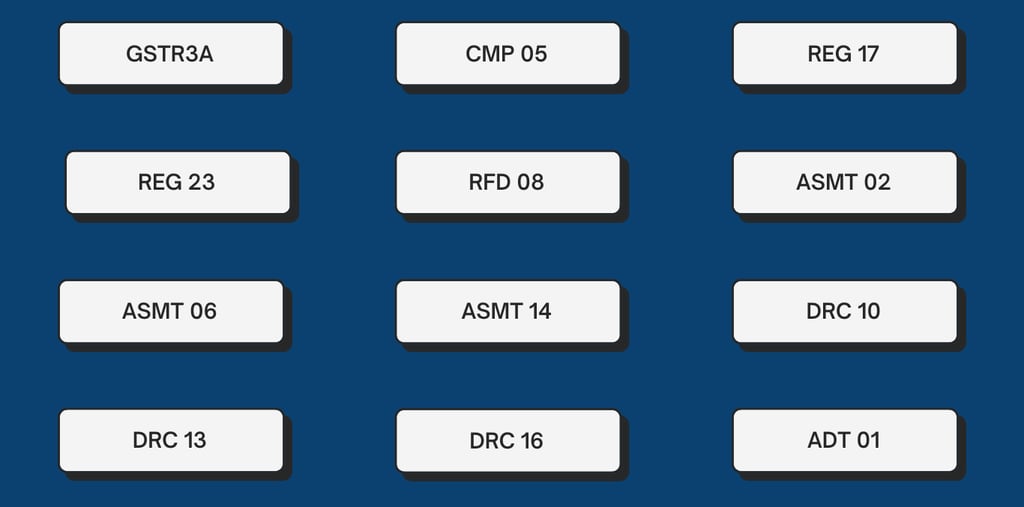Types of GST Notices
Different types of notices can be received by the taxpayer
Ekatra Consulting
4/21/20234 min read


The Goods and Services Tax (GST) is a tax that is levied on goods and services that are bought and sold in India. It was introduced in July 2017 to replace the complex web of indirect taxes that existed previously. Under the GST system, the government has the power to issue notices to taxpayers who fail to comply with the GST regulations. In this blog, we will discuss the various types of GST notices that can be issued. Notices under GST are communications by the GST Authorities. A notice so issued, depending upon the purpose or gravity of default or action required from the taxpayer, can be called by different names e.g. Show Cause Notice (SCN), Scrutiny Notice or Demand Notice. GST authorities act based on any hints collected on scrutinising taxpayer’s GST Returns or based on information received from another Government department/ third parties. A few common grounds for receiving notices relating to lapses/ defaults on the part of the taxpayers are -
Notice for Non-Filing of GST Returns:
Under the GST system, taxpayers are required to file various returns such as GSTR-1, GSTR-2, and GSTR-3. If a taxpayer fails to file these returns on time, the government can issue a notice for non-filing of GST returns. The notice will require the taxpayer to file the pending returns within a specified time period. Failure to comply with the notice can result in penalties and legal action.
Notice for Discrepancies in GST Returns:
The GST returns filed by taxpayers are subject to scrutiny by the government. If discrepancies are found in the returns, the government can issue a notice to the taxpayer. The notice will require the taxpayer to explain the discrepancies and provide supporting documents if necessary. Failure to comply with the notice can result in penalties and legal action.
Notice for GST Audit:
Under the GST system, the government can conduct an audit of a taxpayer's books of accounts and other records. If the government decides to conduct an audit, it will issue a notice to the taxpayer. The notice will specify the date and time of the audit and the documents that need to be produced. Failure to comply with the notice can result in penalties and legal action.
Notice for GST Demand:
If the government determines that a taxpayer has paid less GST than they should have, it can issue a notice for GST demand. The notice will specify the amount of GST that is due and the date by which it must be paid. Failure to comply with the notice can result in penalties and legal action.
Notice for GST Refund:
Under the GST system, taxpayers can claim a refund of GST that they have paid on inputs used for the production of goods and services. If the government denies a refund claim, it can issue a notice to the taxpayer. The notice will explain the reasons for the denial and provide the taxpayer with an opportunity to respond. Failure to respond to the notice can result in the denial of the refund claim.
Different types of notices that can be received by the taxpayer;
GSTR3A- Default notice to non-filers of GST returns in GSTR-1 or GSTR-3B or GSTR4 or GSTR8.
CMP-05- Show cause notice – Questioning the eligibility to be a composition dealer.
REG-17 - Show cause notice why should the GST registration not be cancelled for the reasons laid down in the notice.
REG-23 - Show cause notice why the cancellation of GST registration must be revoked, for the reasons laid down in the notice.
RFD-08 - Show cause notice as to why the GST refund must not be made to the applicant (taxpayer).
ASMT-02 - Notice for Seeking Additional Information for provisional assessment under GST.
ASMT-06 – Scrutiny Notice-Notice for intimating discrepancies in the GST return after scrutiny along with tax, interest and any other amount payable in relation to such discrepancy, if any.
ASMT-14 - Show Cause Notice for assessment under section 63- reasons for conducting the assessment on the best judgment basis.
ADT-01 - Notice for conducting audit by Tax authority under Section 65.
RVN-01 - Notice under section 108 issued to the taxpayer by the revisional authority before passing the revision order of appeals, giving the opportunity of being heard. Order of revision is usually passed to fix errors in order for appeals passed under section 108.
DRC-01 - Show cause Notice for Demand of Tax- Is issued for demanding tax paid shortly or not paid with or without an intent to defraud. It is served along with a statement of details in DRC-02.
DRC-10 And DRC-17 - Notice of Auction of Goods under section 79(1)(b) of the Act- Reference to the order of demand will be given, being the order for recovery through specified officer under section 79 OR Recovery through execution of decree.
DRC-13 - Notice of Recovery of outstanding tax from a third person.
DRC-16 - Notice for attachment and sale of immovable/movable goods/shares under section 79
Conclusion :
The GST system is designed to streamline the collection of indirect taxes in India. However, it also gives the government the power to issue notices to taxpayers who fail to comply with the regulations. As a taxpayer, it is important to understand the different types of GST notices that can be issued and to respond to them in a timely and appropriate manner. Failure to comply with a notice can result in penalties and legal action.
Click To Download the Notice Reply Format
